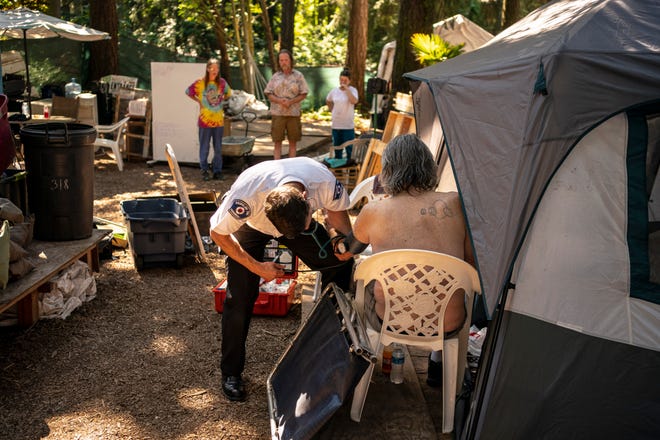As the number of people experiencing homelessness increases across the country, more cities and states have passed laws making it illegal to live out of tents and cars or sleep in public spaces.
More than 100 jurisdictions have had such bans on the books for years, according to the National Homelessness Law Center. In recent months, high-profile measures have been approved targeting homelessness in many western U.S. cities and across entire states.
Federal data shows 582,462 people were experiencing homelessness on a single night in January 2022. Experts warn more people will enter homelessness as housing costs increase, as has been the case for decades in cities such as New York and in much of California.
If visible, unsheltered homelessness continues to grow, city leaders will have an easier time passing measures advocates say criminalize basic needs such as sleep and sheltering oneself, Eric Tars, legal director for the National Homelessness Law Center, told USA TODAY.
“The danger is that the worse the housing situation gets, the more people we see on the streets, the more will be the push for these punitive policies,” Tars said.
These states and cities have passed laws making it illegal to live in tents or sleep on public property:
Missouri bans sleeping in parks
On Jan. 1, a statewide ban on sleeping on state-owned land took effect in Missouri, making it a misdemeanor to sleep in public spaces such as parks or under bridges.
Experts say Missouri’s law is concerning because it covers the state and adds pressure on top of municipal bans.
It’s wrong to assume people experiencing homelessness can just leave and go to another state, Tars said.
People have an “assumption” that “homeless people are infinitely mobile and they’ll go somewhere else,” Tars said. “But most people, contrary to this notion of vagrancy and transience, are homeless in the community where they were once housed.”
Missouri’s law also restricts state funding for permanent housing, a model taken from template legislation created by the conservative Cicero Institute, according to Stateline, the Pew Charitable Trusts news service.
“To take funding away from housing that has the appropriate resources attached to it is devastating, problematic and perpetuates the issue of homelessness,” said Kathy Connors, executive director of Gateway180 shelter in St. Louis. She added that people experiencing homelessness who are displaced from rural areas are forced to seek temporary services available only in cities, which is straining the system.

Tennessee makes it a felony to live in a tent
In July, Tennessee became the first state to make it a felony to live in a tent or sleep on state land.
Statewide bans have been introduced in recent years by legislators in five other states, Pew says.
“Policies like this are making homelessness worse,” Tars said, because arrest, jail time and a criminal record put up steep barriers to employment, securing an apartment and accessing social services.
Portland, Oregon, bans tent living
The City Council in Portland, Oregon, voted in November to approve a plan to ban living in tents and will shift people living in encampments into six city-sanctioned mass encampment sites capped at 250 people.
The measure includes plans to build 20,000 additional affordable housing units and eventually would require everyone living on the streets to move into shelters, Oregon Public Broadcasting reported.
The American Civil Liberties Union of Oregon sent the Portland City Council a letter warning the new measure could be unlawful. Last month, the civil rights group sued the city of Phoenix over a similar ban, resulting in a temporary block from a federal judge.
Oregon’s recently elected Gov. Tina Kotek started her term this week by declaring a state of emergency for parts of the state that have seen huge increases in unsheltered homelessness, including Portland.

Washoe County, Nevada, considers bans
In December, Washoe County Commissioners in Nevada voted 3-2 to consider an ordinance to ban camping in tents or vehicles and storing personal items in public when it poses “significant harm to any person, or public area.” Violators could be charged with a misdemeanor or a $500 fine. Within the county, Reno and Sparks already had similar ordinances in place.
In 2021, 25% of young people experiencing homelessness served by the Eddy House shelter in Reno lived on the streets, CEO Trevor Macaluso told USA TODAY. He added that people displaced by sweeps in Reno and Sparks usually relocate their encampment somewhere else in the city, which makes the bans ineffective.
Los Angeles bans some homeless tent cities
A City Council-approved ban on tent living in certain areas was expanded in August 2022 to prohibit encampments within 500 feet of schools and day care centers after teachers and parents complained students couldn’t access nearby sidewalks.
School administrators have said the ban isn’t always enforced by the city and police, according to EdSource, an outlet covering education in California.
More recently, the mayors of Los Angeles and Long Beach and Los Angeles County declared states of emergency over the homeless crisis aimed at speeding up services to reduce and prevent homelessness.


